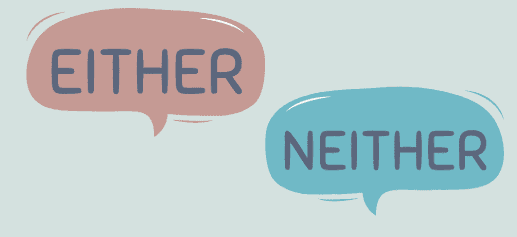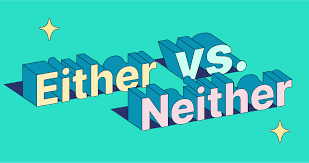Either vs Neither: Understanding the Choice and Negation
Contents

Imagine you're on a conference call with colleagues from different countries. Suddenly, you're unsure whether to say 'either' or 'neither' in a tricky situation. This happens a lot to non-native English speakers in India, so it's important to understand these words for clear communication.
In this blog post, we'll explain when to use 'either' and 'neither', give easy rules to remember, point out common mistakes, and include either vs neither exercises. We'll also use either vs neither examples to help you use these words confidently in everyday conversations.
What does Either vs Neither mean?
'Either' is used to express a choice between two alternatives. For instance, "You can either have a samosa or a vada pav." Here, 'either' gives you an option to choose one out of the two mentioned.
'Neither' is used to deny both of the two alternatives. For example, "I neither drink tea nor coffee." Here, 'neither' indicates that not even one out of the mentioned options is true for me.
The either vs neither meaning can vary a bit in different contexts:
'Either' can also mean 'both', like in "There are shops on either side of the road", implying shops on both sides.
'Neither', if used alone and not with ‘nor’, can express agreement with negative statements. For instance, if someone says "I don’t like spicy food.", you might respond with "Me neither!", meaning you also don't like spicy food.
How is Either Used in Sentences?
'Either' is typically used to indicate one of two possible choices. Let's examine some examples of 'either' in sentences.
For instance, you could say, "You can either go by train or by bus to Chennai." In this sentence, the use of 'either' implies that there are two travel options: train or bus.
Correct Usage | Incorrect Usage |
Either eat your vegetables, or leave the table. | Either eat your vegetables or leave. |
You can either play cricket or study for your exams. | You can either play cricket or studying for exams. |
How is Neither Used in Sentences?
'Neither' is used when you want to say that two or more things are not true or possible. It negates both parts of a statement, offering a negative balance to 'either'.
For example, "Neither Rohit nor Virat will be playing in tomorrow's match", means that both Rohit and Virat will not play.
Correct Usage | Incorrect Usage |
Neither Ravi nor Raj met their target sales this month. | Neither Ravi nor Raj has meeting their targets this month. |
I like neither coffee nor tea. | I like neither coffee or tea. |
Either vs. Neither: Spot the Difference

Understanding the difference between 'either' and 'neither' can be tricky, but fret not. Let's look at a simple table that outlines the correct either vs neither usage:
Term | Usage | Example |
Either | Used to indicate one or another in a positive context | "You can either have tea or coffee." |
Neither | Denotes not either, used in negative contexts | "Neither tea nor coffee is available." |
Here are a few tips to remember: When you see 'either', think of options ('either this or that'), and when you see 'neither', think of denial ('neither this nor that'). Keep practising the use of these terms with various 'either vs neither exercises' online.
Let's Practice! Neither and Either Exercises for you!
Perfecting the usage of 'either' and 'neither' might seem challenging, but it's all about practice. Here are some exercises for you.
Fill in the blanks:
___________ Ravi ___________ Rohan was able to answer the question correctly.
Which is correct?
I don't like coffee and my brother doesn't like coffee too OR I don't like coffee and ________ does my brother.
Complete this sentence:
_________ he nor his friends arrived at the party on time.
Answers with Explanations:
"Neither...nor." Here, both Ravi and Rohan were unable to answer, hence 'neither…nor' is used.
"I don't like coffee and neither does my brother." In this situation, we are expressing a negative state that exists in more than one person hence we use 'neither'.
"Neither he nor his friends arrived at the party on time." When we want to indicate that two or more people did not do something, we use 'neither…nor'.
The Magic of Either and Neither in Conversations
Knowing when to use 'either' or 'neither' improves your conversation skills, making you clearer and more fluent. Clapingo's personalized coaching helps you practice these tricky terms. Here's a video to give you a taste. Start improving your conversation skills with Clapingo today:
Wrapping Up
As we finish talking about "either vs neither", let's summarize. Both words give you a choice between two things, but they're used differently. "Either" means one of the options is true, while "neither" means both are false. Knowing this helps you use them right when you talk.
Learning English can seem hard, but practising regularly and getting the right help makes it easier. Try some either vs neither exercises or chat in English with friends to improve. At Clapingo, we help Indian speakers with English, focusing on fluency and grammar in a friendly setting.
Explore our blog for more tips on spoken English. Remember, it's okay to make mistakes while learning. The key is to keep trying and soon you'll use "either" and "neither" perfectly!
Frequently Asked Questions (FAQs)
1. What does 'either' mean?
'Either' is used to indicate one out of two options. For example, "You can have either tea or coffee."
2. How is 'neither' used?
'Neither' signifies a negative condition and is used when neither of the two options apply. Example: "Neither Hindi nor English is my mother tongue."
3. Can I use 'either' and 'neither' interchangeably?
No. While both deal with two choices, they aren't interchangeable. 'Either' has a positive connotation (one of the two), while 'neither' signifies negation (not one nor the other).